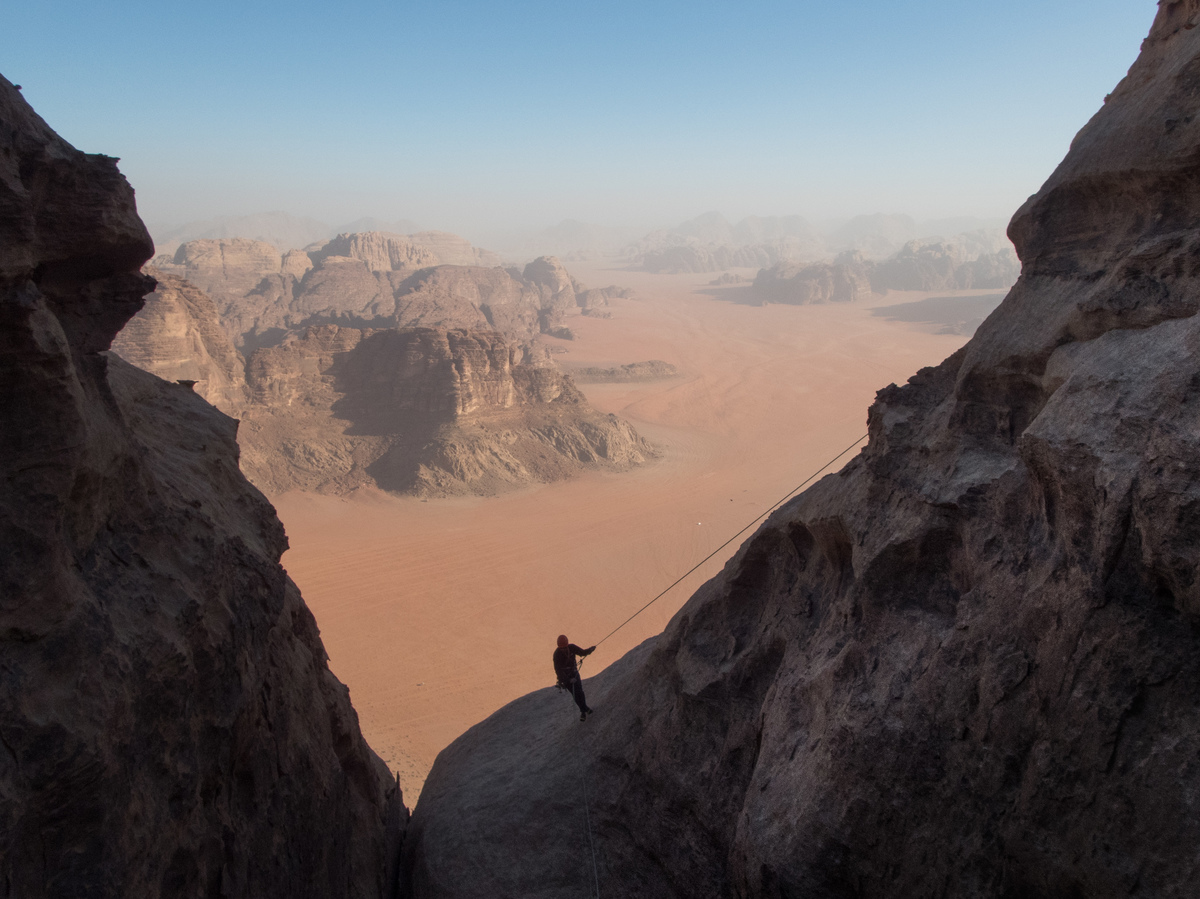
Jordan: an Arabian Jewel
A reportage by Steve Long dedicated to the UIAA Training Panel’s recent activities in Jordan.
Supported by its sponsorship donations, the UIAA Training Panel is currently engaged in several initiatives directed at protecting mountain communities. Over the past two years, it has partnered the Jordan Tourist Board, adding the country to a project portfolio which includes Ladakh, Nepal and Turkey. In all these projects the end goal is to help create a sustainable qualification structure that fulfils the high accreditation requirement for the Mountain Qualification Label programme. The generous support of The Petzl Foundation, and of the Jordan Tourism Board, enable the UIAA Training Panel, chaired by myself, to extend its budget on direct action activities.
The initial aim of the project in Jordan is to train suitably experienced individuals from Bedouin communities in leadership skills for trekking, climbing and canyoning, bringing in a team of teachers from the UIAA training community, with representation from the UK, France, Spain, Turkey and Russia. Because of the environmental challenges and the difficulties encountered in “teaching climbing as a foreign language” all the staff needed to hold either their country’s national qualification or be members of UIMLA or IFMGA.
Although Jordan is a small country the landscape is incredibly diverse. For the project the main centres are Dana (wildlife reserve with sandstone domes), Petra (Raiders of the Lost Ark terrain), Wadi Rum (desert monoliths and walls) and the Dead Sea area (canyonland). Each location is unique but all are characterised by nomadic shepherding and a timeless, biblical heritage.


A difficult beginning
The first batch of courses were more demanding than we anticipated. Our trio of trainers discovered that winters in Jordan can be a lot colder than expected, and there were many cultural lessons to learn in order to understand the trainees’ needs and to motivate them to commit to the project. Everything took a lot longer than anticipated, as the regular tea breaks require a team effort to gather firewood and herbs and often merge into musical sessions, bouldering and general merry-making. We soon discovered that you have to go with the flow!
The Jordan government has strong aspirations to protect its wildlife but is often at odds with the Bedouins, who resent what they see as outside interference. Tribal autonomy is regarded as paramount, and we soon discovered that village rivalries are so ingrained and complex that it often requires complete segregation in order to teach practical skills – this is particularly marked in the Wadi Rum regions, where Rum villagers have to date regarded themselves as the mountain experts whereas their neighbours from Disi lack appropriate role models. This made teaching each village difficult for different reasons, compounded by the fact that training initiatives have come and gone over the decades, so the trainees seemed genuinely surprised when we arrived with reinforcements for the second wave of courses.

Successful consolidation
For the second year we were armed by experience and aided by constant negotiating and bridge-building behind the scenes by the Tourist Board. We increased staffing numbers, and added a day or two to each course. Most of the candidates were now more willing to move out of their comfort zones, and we were therefore able to organise some genuinely adventurous journeys that required the navigational, ropework and organisational skills that we were coaching, in order to reach the destinations. Several times the outcome was uncertain for most of the journey and we had almost resigned ourselves to retracing our steps. Celebrations ensued every evening, with greater confidence and motivation the following dawn. Recognising a need for genuine beginners’ crags, we helped local communities clean and prepare a crag near Disi and another near Little Petra for top-roping and leading in casual footwear, since typical clients are unlikely to have rock shoes.
The long-term goal is to hand over management and delivery of qualifications to a home-grown federation of mountaineering activists. Whether this is achievable remains to be seen: certainly a lot of bridges remain to be built over the coming years.

Article and images by Steve Long, Chair of UIAA Training Panel
The UIAA Mountain Qualification Labels
The UIAA Mountain Qualification Labels are an internationally recognized accreditation and certification scheme that examines and evaluates the leadership and instructor training and assessment programs of our member federations. The MQL helps federations to adopt best practice for safety, skills and sustainability as well as allowing opportunities for mutual cooperation between federations. Apply to our programme.
